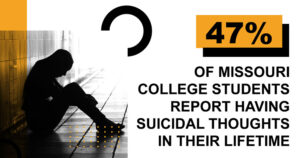 College-bound teens and young adults spend months preparing to go off to school. At this part of their journey, they are making decisions about meal plans and where to live, as well as class schedules and financial aid packages. These are not easy decisions. Even more difficult decisions and situations are to come once school starts. Although the focus is on the student during this time of major life change, it’s an important time for parents to take a step back and think: How can I be the best support system for my child during their college career, and foster a relationship built on trust? How can I help my child through a mental health crisis?
College-bound teens and young adults spend months preparing to go off to school. At this part of their journey, they are making decisions about meal plans and where to live, as well as class schedules and financial aid packages. These are not easy decisions. Even more difficult decisions and situations are to come once school starts. Although the focus is on the student during this time of major life change, it’s an important time for parents to take a step back and think: How can I be the best support system for my child during their college career, and foster a relationship built on trust? How can I help my child through a mental health crisis?
According to the 2022 Missouri Assessment of College Health Behaviors, a Partners in Prevention study, nearly half (47 percent) of Missouri college students report having suicidal thoughts in their lifetime, and 25 percent of students report suicidal thoughts in the past 12 months. In the past 12 months, 2.1 percent of students report attempting suicide. It’s no secret that college students are taking on massive amounts of stress. Keeping this research in mind, parents should always have their child’s mental health safety at the top of mind and be willing to see their child’s point of view from other perspectives.
A Young Adult's Story
While young adults may not be interested in listening to their parents, they may seek advice from someone who has been in their shoes or someone who is close to them in age.
Britt Grindstaff is the Youth and Young Adult Coordinator at the Behavioral Health Network of Greater St. Louis. At the Behavioral Health Network, Britt brings lived experience to her position — as a young adult who has lived with a mental illness — to help inform the organization’s program and projects. Britt attended St. Louis University from 2015 through 2020; she took a brief break from school during her senior year due to mental health challenges. Britt wants parents to understand just how common it is for college to be a tipping point in a students’ mental health journey.
“I’ve witnessed a lot of parents who feel like their child struggling with their mental health came out of left field, and they weren’t prepared to interact and support them within this new context or situation,” Britt says. She urges parents to realize that college can bring overwhelming amounts of stress and anxiety. “There are so many responsibilities and expectations that I often felt completely unprepared for,” she says. “When I expressed how overwhelmed I was, I was often met with, ‘That’s just the way things are’ or I was provided no practical support.”
The Missouri Department of Mental Health works closely with behavioral health providers around the state, such as the Compass Health Network. Wayne Johnson is the Team Lead for the organization’s ACT TAY (Assertive Community Treatment – Transitional Age Youth) program at Compass Health Network, which provides psychosocial services directed to transitional age youth (ages 16-25) with severe and persistent mental illness. He says open communication is the cornerstone of how parents can help their children.

“The transitional age of 16-25 can be a very difficult time in figuring out identity, gaining independence and struggling to fit in the world,” Wayne says. “It is especially hard for those who are experiencing mental illness and the side effects that can bring. In our experience working with this age group, we have found that providing a safe space for people to be heard and validated, a structure of consistency, encouraging employment, continued education, or tech training and building a natural support system have been effective in supporting this transition.”
Knowing this information, what else can parents be doing to help their child through tough times? Being non-judgmental is at the top of the list.
“One of the most terrifying moments of my life was when I told my parents I wasn’t passing classes because my depression had gotten so bad,” she explains. “But they didn’t bat an eye. They stepped up to help me connect with student affairs for academic accommodations and gave me the reassurance that this wasn’t something that made me a ‘bad’ student or person.”
Honesty and vulnerability provide other avenues to connect with a struggling student. Having a one-sided conversation may be isolating for them, so be open to sharing your feelings, thoughts and experiences too.
“Being able to have those tough conversations with your child will not only help them feel validated and normalized, but it will help bring you closer,” Britt says. “Ask your child how they want to be supported and respect their answer. You may not be able to ‘fix’ every situation and your young adult may want to make a different choice or approach than you would, but that is okay.”
Most importantly, be open to admitting your mistakes and be transparent in saying “I was wrong.”
“For every instance my parents have been incredible and supportive, there have been moments where they’ve unintentionally caused more harm or made choices that with the knowledge, they have now around mental illnesses they never would consider now,” Britt says. “But they’ve approached those moments with humility and honesty, and used them as opportunities to grow. It can be so difficult to acknowledge when, even with the best intentions, we have caused someone harm or pain but to not acknowledge it is to discredit their experiences and feelings.”
ASAP Help
Mental health support and crisis intervention are always available with the 988 National Crisis Line. Call or text 988 from anywhere in the U.S. to speak with a trained crisis counselor via a secure online platform. The mental health professional can help talk through issues, including financial-related stress. The Crisis Text Line is open 24 hours a day, seven days a week.

 Here’s a daunting statistic about Missouri’s college students and mental health: one in four college students in the state have had suicidal thoughts in the past year. Upon hearing that, parents may turn a blind eye and say, “Yeah, but that’s not my kid.”
Here’s a daunting statistic about Missouri’s college students and mental health: one in four college students in the state have had suicidal thoughts in the past year. Upon hearing that, parents may turn a blind eye and say, “Yeah, but that’s not my kid.” For parents, it is so important to prioritize kids’ mental health just as you would physical health, and normalize seeking out help. Parents must look out for and care about all aspects of their child’s mental health in order to properly address suicide prevention. This includes whether or not their child is interacting with substances, if they are caring for their bodies, and if they know how to access and ask for services before they get to college. Joan encourages parents to equip their child with tools such as the ability to recognize if something is physically or mentally not right with their body, when to reach out and get help, how to resist self-medicating, and how to advocate for themselves.
For parents, it is so important to prioritize kids’ mental health just as you would physical health, and normalize seeking out help. Parents must look out for and care about all aspects of their child’s mental health in order to properly address suicide prevention. This includes whether or not their child is interacting with substances, if they are caring for their bodies, and if they know how to access and ask for services before they get to college. Joan encourages parents to equip their child with tools such as the ability to recognize if something is physically or mentally not right with their body, when to reach out and get help, how to resist self-medicating, and how to advocate for themselves. “Normalize mental health services and talk to your kids about what they are feeling and what they are thinking about, and ask if they need assistance with mental health care,” Joan says. “Create an ‘In this house, we seek therapy’ environment to take down the stigmas.”
“Normalize mental health services and talk to your kids about what they are feeling and what they are thinking about, and ask if they need assistance with mental health care,” Joan says. “Create an ‘In this house, we seek therapy’ environment to take down the stigmas.” The New York Times
The New York Times Suicides are preventable. Improving mental health and trauma literacy is a critical step in decreasing suicides and recognizing the warning signs to get people the help they need as early as possible. Students, parents and family, and colleges and community organizations can make a commitment to enhance their mental health literacy by using any of the following resources provided in Missouri.
Suicides are preventable. Improving mental health and trauma literacy is a critical step in decreasing suicides and recognizing the warning signs to get people the help they need as early as possible. Students, parents and family, and colleges and community organizations can make a commitment to enhance their mental health literacy by using any of the following resources provided in Missouri. Family members, close friends, classmates, professors, teaching assistants, counselors and advisors all provide help and resources in their own way, making the college transition and overall experience much smoother and easier for students. Parents, however, may have the biggest supporter role of all. From early on in the college decision-making process, parents should serve as a guiding light for their child as they make decisions that could affect the next four years of their lives. Which college is best for them, and how do you know? What kind of financial aid do they need? Are they applying for scholarships, grants and loans?
Family members, close friends, classmates, professors, teaching assistants, counselors and advisors all provide help and resources in their own way, making the college transition and overall experience much smoother and easier for students. Parents, however, may have the biggest supporter role of all. From early on in the college decision-making process, parents should serve as a guiding light for their child as they make decisions that could affect the next four years of their lives. Which college is best for them, and how do you know? What kind of financial aid do they need? Are they applying for scholarships, grants and loans? Tell your child that they can come to you with any problem. Some children may fear what you may say in response to their issue, or feel like they are burdening you with their problems. Remind them that you are always there for them and are always ready to lend an ear to listen.
Tell your child that they can come to you with any problem. Some children may fear what you may say in response to their issue, or feel like they are burdening you with their problems. Remind them that you are always there for them and are always ready to lend an ear to listen. Sarah Curzi, PhD encourages the creation of a “mental health plan” that encourages parents and children to be open to conversations about mental health struggles and concerns, in an effort to destigmatize them. In an article for
Sarah Curzi, PhD encourages the creation of a “mental health plan” that encourages parents and children to be open to conversations about mental health struggles and concerns, in an effort to destigmatize them. In an article for 
 It is important to create a level of excitement for kids at a young age, whether it’s through a job, hobby, sports or another healthy activity. Otherwise, the young mind tends to gravitate towards unhealthy ways of achieving enjoyment, such as risk-taking behaviors.
It is important to create a level of excitement for kids at a young age, whether it’s through a job, hobby, sports or another healthy activity. Otherwise, the young mind tends to gravitate towards unhealthy ways of achieving enjoyment, such as risk-taking behaviors.  Today.com
Today.com Change is inevitable when a student goes off to college. Students who have gone away have to adapt to a new place to live, new friends and teachers, new learning environments, and new challenges that come with this next phase in their lives. Parents have to adapt to new ways to give their support and be there for their student. One thing that remains the same, however, is the need for both sides to communicate how they are doing and feeling during these times.
Change is inevitable when a student goes off to college. Students who have gone away have to adapt to a new place to live, new friends and teachers, new learning environments, and new challenges that come with this next phase in their lives. Parents have to adapt to new ways to give their support and be there for their student. One thing that remains the same, however, is the need for both sides to communicate how they are doing and feeling during these times. If you believe a larger mental health issue is happening and that it is time to step in, first, determine the urgency of the situation. This will guide your approach to intervening. The University of Iowa shares this guidance about starting the conversation with students who are struggling with their mental health:
If you believe a larger mental health issue is happening and that it is time to step in, first, determine the urgency of the situation. This will guide your approach to intervening. The University of Iowa shares this guidance about starting the conversation with students who are struggling with their mental health:
 This begs the question: What makes post secondary education an attractive option for some, but the complete opposite for others? The answer may be apathy.
This begs the question: What makes post secondary education an attractive option for some, but the complete opposite for others? The answer may be apathy. Within these conversations, College Parent Central wants you to encourage your child to explore their interests and find others who may share those interests. If they are having trouble making friends, share with them opportunities to volunteer, join a club, engage in activities on campus or find a part-time job they know they will enjoy. Remind them that there are many resources available at school, including health and counseling centers. Talk to them about self-care, whether that may be exercise, therapy or taking mental health days.
Within these conversations, College Parent Central wants you to encourage your child to explore their interests and find others who may share those interests. If they are having trouble making friends, share with them opportunities to volunteer, join a club, engage in activities on campus or find a part-time job they know they will enjoy. Remind them that there are many resources available at school, including health and counseling centers. Talk to them about self-care, whether that may be exercise, therapy or taking mental health days.
 There are many ways to deal with empty nest syndrome. To start, PsychCentral shares these coping mechanisms.
There are many ways to deal with empty nest syndrome. To start, PsychCentral shares these coping mechanisms.
 First, check in without making it seem like you are interviewing them. Instead of asking what happened in their life today, ask how they are doing or how they are feeling. Give them your undivided attention. The most important thing to remember is that teens will come to you for your support when they need it.
First, check in without making it seem like you are interviewing them. Instead of asking what happened in their life today, ask how they are doing or how they are feeling. Give them your undivided attention. The most important thing to remember is that teens will come to you for your support when they need it.
 The best way your child can learn about financial responsibility is to create an open dialogue with them about money and remain transparent. According to a study from the
The best way your child can learn about financial responsibility is to create an open dialogue with them about money and remain transparent. According to a study from the  Financial stress around college can also impact mental health in negative ways, for a short period of time or more long-term.
Financial stress around college can also impact mental health in negative ways, for a short period of time or more long-term.